Who Said ‘Eureka’ First And Why?
Conny Waters - AncientPages.com - When someone says "Eureka," it's because they have suddenly found or realized something or solved a problem. Scientists often shout Eureka when they have made a triumphant discovery.
Borrowed from ancient Greek: εὕρηκα the word Eureka means "I have found it!"
It can be interesting to know the origin of a famous word like "Eureka." Who said Eureka first, and why?
Archimedes by Domenico Fetti 1620 - Credit: Public Domain
The first documented "Eureka!" moment can be traced to the ancient Greek scientist Archimedes.
Archimedes was a great scholar from Syracuse, the ancient capital of Sicily, originally a Greek colony founded by Corinth in 734 BC.
"Not much is known about Archimedes, and information about him comes only from the introduction of his works and from numerous anecdotes often quoted by ancient historians.
He was the son of Fidias, an unknown astronomer about whom nothing is known. Even the year of Archimedes' birth (probably about 287 BC) has never been established with absolute certainty." 1
"Archimedes studied at the Alexandrian Museum from about 260 BC, before returning to his native Syracuse in Sicily to continue his work. To glance at a few of his achievements: his masterly mathematical proofs at times anticipated integral calculus; he invented by himself and developed to incredible elaboration the science of hydrostatics (the pressure and equilibrium of liquids at rest); he was the first man to work out accurately the value of pi; and he was the first to come up with the formula for measuring the volume of a sphere. Arguably, no other mathematician has ever made so many advances." 2
On one occasion, Archimedes was confronted with a scientific problem he could not solve quickly.
King Hieron II of Syracuse in Sicily gave a goldsmith a gold bar to make into a crown. The goldsmith delivered the pure gold crown to the King, but was suspicious, thinking the goldsmith had cheated him.
To find out if the crown he had received was made of solid gold or whether he had been palmed off with one containing silver, the King asked Archimedes to solve the problem.
Determining whether the crown was made of only gold was tricky without melting it down and, by doing so, destroying it.
Archimedes knew that gold and silver have different densities, meaning that a lump of gold will weigh about twice as much as a lump of silver the same size. The trouble was that no one knew how to work out the size of an irregularly shaped object like a crown. While pondering this conundrum, Archimedes went to the public baths to relax.
The answer came to him while he was taking a bath. Archimedes noticed that the water level rose when he got in, and it struck him that he could determine the gold density of the crown by weighing it in water.
Archimedes' principle states that any object, totally or partially immersed in a fluid, is buoyed up by a force equal to the weight of the fluid displaced by the object.
16th-century illustration of Archimedes in the bath, with the crown of King Hieron II at bottom right. Credit: Public Domain
To make a long story short, Archimedes discovered the hydrostatic law of buoyancy while bathing and playing with a rubber duck and a plastic boat. Eager to tell King Hieron II of Syracuse, the goldsmith had deceived him and, excited by his discovery, ran out into the streets of Syracuse, screaming, "Eureka!" which means "I found it."
He ran out into the streets of Syracuse, screaming, "Eureka!" which means "I found." Archimedes probably did not even notice that he was naked and on his way to the ruler.
"Thus, the great man became known to the city's inhabitants not only as a brilliant scholar but also as an exhibitionist." 1
It is difficult to say whether the story is true because there is no "proper evidence for it.
There is a series of such apocryphal tales in the history of science.
There is no evidence for Archimedes leaping from his bath, no evidence that Galileo dropped cannon balls from the leaning tower of Pisa (he knew of much better experiments than this already), no evidence that Newton had a realization about gravity while sitting under an apple tree, or that Watt invented the steam engine while watching a kettle boil (the steam engine had long been invented, and Watt's improvements to it had nothing to do with steam expanding)." 3
Updated on April 8, 2024
Written by Conny Waters – AncientPages.com Staff Writer
Copyright © AncientPages.com All rights reserved. This material may not be published, broadcast, rewritten or redistributed in whole or part without the express written permission of AncientPages.com
Expand for referencesMore From Ancient Pages
-
 Humans Lived In Rainforests At Least 150,000 Years Ago In Africa
Human Beginnings | Feb 27, 2025
Humans Lived In Rainforests At Least 150,000 Years Ago In Africa
Human Beginnings | Feb 27, 2025 -
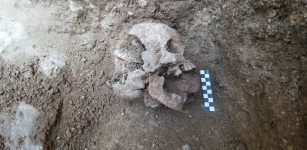 ‘Vampire Of Lugnano’ And Old Beliefs In Witchcraft: Eerie And Weird Discovery In Italy
Archaeology | Oct 13, 2018
‘Vampire Of Lugnano’ And Old Beliefs In Witchcraft: Eerie And Weird Discovery In Italy
Archaeology | Oct 13, 2018 -
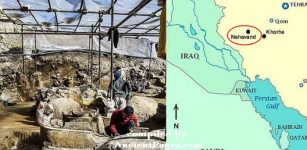 More Evidence Linked To Enigmatic Laodicea Temple In Nahavand Found By Iranian Archaeologists
Archaeology | Aug 7, 2020
More Evidence Linked To Enigmatic Laodicea Temple In Nahavand Found By Iranian Archaeologists
Archaeology | Aug 7, 2020 -
 Shin-Au-Av – Secret Ancient Underground City Hidden Beneath Death Valley
Featured Stories | Jun 6, 2024
Shin-Au-Av – Secret Ancient Underground City Hidden Beneath Death Valley
Featured Stories | Jun 6, 2024 -
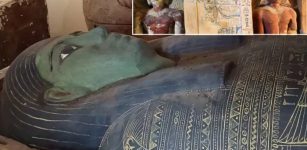 New Trove Of Treasures, Funerary Temple, 50 Sarcophagi Unearthed In Saqqara, Cairo
Archaeology | Jan 18, 2021
New Trove Of Treasures, Funerary Temple, 50 Sarcophagi Unearthed In Saqqara, Cairo
Archaeology | Jan 18, 2021 -
 Glooskap (Gluskap): Mythical Hero Who Defeated Evil Sorcerers And Demon Followers
Featured Stories | Jan 25, 2016
Glooskap (Gluskap): Mythical Hero Who Defeated Evil Sorcerers And Demon Followers
Featured Stories | Jan 25, 2016 -
 Movie Stars’ Creepy Encounters With The Unexplained
Featured Stories | Oct 28, 2019
Movie Stars’ Creepy Encounters With The Unexplained
Featured Stories | Oct 28, 2019 -
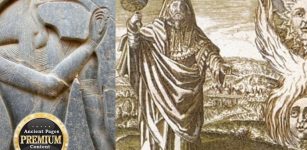 Secrets Of Hermes Trismegistus Who Brought Divine Wisdom To Mankind
Featured Stories | Feb 23, 2025
Secrets Of Hermes Trismegistus Who Brought Divine Wisdom To Mankind
Featured Stories | Feb 23, 2025 -
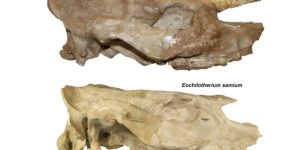 Fossilized Skulls Reveal Relatives Of Today’s Rhinos Had No Horn And Died Out 5 Million Years Ago
Fossils | Nov 2, 2023
Fossilized Skulls Reveal Relatives Of Today’s Rhinos Had No Horn And Died Out 5 Million Years Ago
Fossils | Nov 2, 2023 -
 Dwarf Alvis (‘All-Wise’) Who Was Tricked By God Thor And Turned Into Stone
Featured Stories | May 27, 2019
Dwarf Alvis (‘All-Wise’) Who Was Tricked By God Thor And Turned Into Stone
Featured Stories | May 27, 2019 -
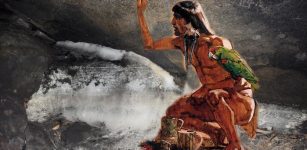 Ancestral Puebloans Survived Devastating Climate Change Hiding In New Mexico Lava Tubes
Archaeology | Nov 20, 2020
Ancestral Puebloans Survived Devastating Climate Change Hiding In New Mexico Lava Tubes
Archaeology | Nov 20, 2020 -
 Ancient Bone Reveals Syphilis May Have Originated In The Americas – Columbus Theory Questioned By Scientists
Archaeology | Dec 20, 2024
Ancient Bone Reveals Syphilis May Have Originated In The Americas – Columbus Theory Questioned By Scientists
Archaeology | Dec 20, 2024 -
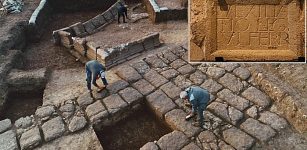 1,800-Year-Old Legio VI Ferrata Military Camp Uncovered In Israel
Archaeology | Feb 21, 2024
1,800-Year-Old Legio VI Ferrata Military Camp Uncovered In Israel
Archaeology | Feb 21, 2024 -
 Ancient Byblos: Powerful Phoenician City With Own Kings
Civilizations | Apr 23, 2016
Ancient Byblos: Powerful Phoenician City With Own Kings
Civilizations | Apr 23, 2016 -
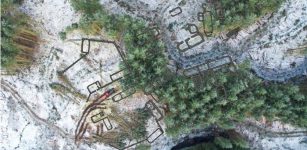 Ruins Of Post-Medieval Brunell Township Discovered In Glen Brittle Forest On The Isle of Skye
Archaeology | Feb 29, 2024
Ruins Of Post-Medieval Brunell Township Discovered In Glen Brittle Forest On The Isle of Skye
Archaeology | Feb 29, 2024 -
 2,500-Year-Old Phoenician Shipwreck Being Rescued By Archaeologists
Archaeology | Jul 4, 2023
2,500-Year-Old Phoenician Shipwreck Being Rescued By Archaeologists
Archaeology | Jul 4, 2023 -
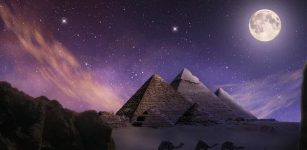 Connection Between Alpha Draconis And Egyptians Pyramids Revealed
Archaeology | Jan 12, 2020
Connection Between Alpha Draconis And Egyptians Pyramids Revealed
Archaeology | Jan 12, 2020 -
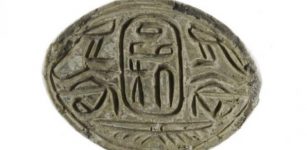 Hyksos: 15th Dynasty Rulers Of Ancient Egypt, Were An Internal Takeover
Archaeology | Jul 15, 2020
Hyksos: 15th Dynasty Rulers Of Ancient Egypt, Were An Internal Takeover
Archaeology | Jul 15, 2020 -
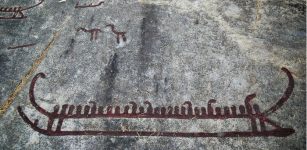 Bronze Age Scandinavians Crossed The Sea Before The Vikings – New Computer Model Reveals
Archaeology | Apr 7, 2025
Bronze Age Scandinavians Crossed The Sea Before The Vikings – New Computer Model Reveals
Archaeology | Apr 7, 2025 -
 Livestock And Dairying Led To Dramatic Social Changes In Ancient Mongolia – New Study
Archaeology | May 11, 2022
Livestock And Dairying Led To Dramatic Social Changes In Ancient Mongolia – New Study
Archaeology | May 11, 2022


